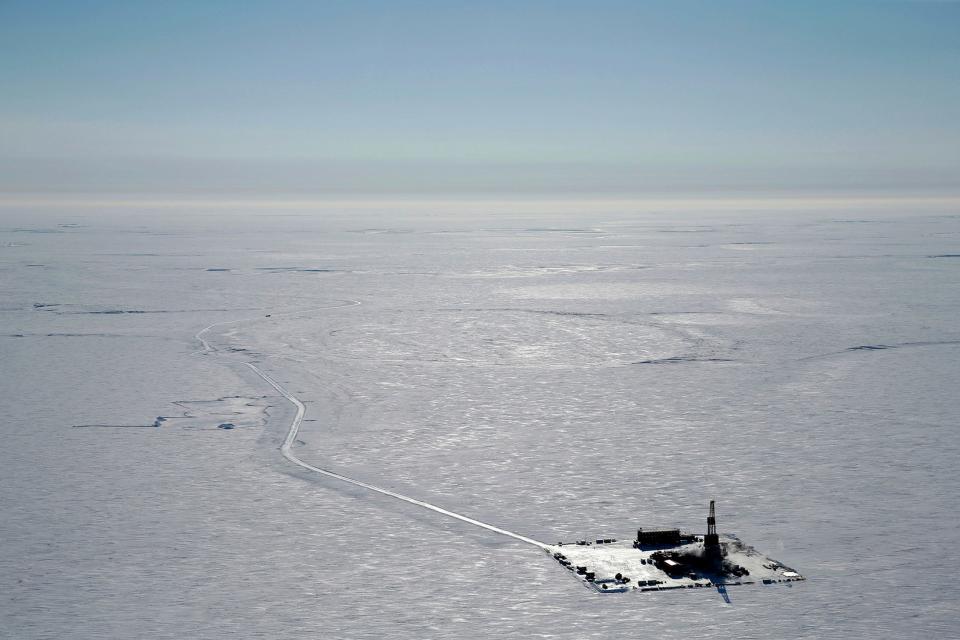Biden approves massive oil project in Alaska, moves to bar future drilling in Arctic Ocean
- Oops!Something went wrong.Please try again later.
WASHINGTON – The Biden administration on Monday approved the controversial Willow oil project, clearing the way for one of the largest new oil and gas developments on federal land in Alaska in 20 years despite fierce opposition from environmental activists.
The move came as President Joe Biden also signaled sweeping future action to bar offshore drilling on 2.8 million acres in the Arctic Ocean in an appeal to critics who said he betrayed his commitment to fight climate change.
The $8 billion Willow project, planned by Houston-based petroleum company ConocoPhillips, marks a shift in the Biden administration's handling of major fossil fuel projects after approving few without congressional or court intervention.
What has been approved?
Where is this? The Willow project is targeted for land within the National Petroleum Reserve-Alaska, an approximately 23-million-acre pristine area on the Beaufort Sea north of the Arctic Circle and about 200 miles west of existing oilfields at Prudhoe Bay.
Scaled back: The Interior Department approved three of five drilling sites proposed by ConocoPhillips. Denying the two others reduced the original size of the 200-well project by about 40% and eliminated 11 miles of roads, 20 miles of pipelines and 133 acres of gravel that would have been required.
Company forfeits 68,000 acres: The company agreed to relinquish 68,000 acres of existing leases in the National Petroleum reserve-Alaska, reducing its footprint in the reserve by one-third.
Environmental "buffer": These steps will create "a buffer" between oil development activities and migration routes for caribou in the area, Interior Department officials said.
What is Biden doing to protect the Arctic?
13 million acres blocked: In anticipation of a backlash from climate activists, the Biden administration on Sunday proposed rules to block future oil and gas leases within more than 13 million acres of the 23-million-acre National Petroleum Reserve-Alaska.
Habitat protections: The rule would block oil and gas leasing in Teshekpuk Lake, Utukok Uplands, Colville River, Kasegaluk Lagoon and Peard Bay, which are known for globally significant habitat including grizzly and polar bears, caribou and migratory birds, according to the Interior Department.
Arctic Ocean oil ban: Biden's action to indefinitely bar future offshore drilling on 2.8 million acres in the Arctic Ocean will complete protections for the entire Beaufort Sea, building upon efforts made during the Obama administration.

Why Biden didn't block the project, according to the White House
The Biden administration was limited by legal restraints in reviewing the Willow oil project, according to a White House official who said the company had valid rights on the land because of decades-old leases.
The administration was convinced the courts would have blocked an outright rejection of the Willow project and potentially imposed fines on the government, said the official, who spoke about the White House’s considerations on the condition of anonymity.
#StopWillow climate activists blast Biden
The approval of the Willow project was met with swift criticism by environmental activists, who had rallied under a #StopWillow hashtag on social media to try to halt the project.
“The Biden administration’s approval makes it clear that its call for climate action and the protection of biodiversity is talk, not action,” said Sonia Ahkivgak, outreach coordinator for the Sovereign Iñupiat for a Living Arctic, a group of Indigenous environmental justice activists.

Kristen Monsell, a senior attorney at the Center for Biological Diversity, called Biden's action's "appalling" and vowed to continue fighting to keep Willow from breaking ground.
“People and wildlife will suffer, and extracting and burning more fossil fuel will warm the climate even faster," Monsell said. "Biden has no excuse for letting this project go forward in any form."
Abigail Dillen, president of Earthjustice, accused the Biden administration of "betraying its core commitment" of ending runaway climate change.
"ConocoPhillips’ Willow project shocks the conscience," Dillen said. "It will open up the whole of the Western Arctic to drilling over many decades, devastating a fragile ecosystem and people who depend upon it."
Mixed reviews by fossil fuel industry
Alaska officials widely support the project, which would bring an estimated 1,000 construction jobs and 400 permanent jobs, while also ensuring the Trans-Alaska Pipeline System keeps operating. Oil revenues provide about one-third of the state's annual budget, and allow the state to provide an annual dividend to residents, set at $3,284 last year.
Some of the Alaska Native people who live in the area support the project because it would mean a significant financial boost to their small communities.
The fossil fuel industry applauded Biden for signing off on Willow but criticized the Arctic protections.
Frank Macchiarola, senior vice president of policy, economics and regulatory affairs at the American Petroleum Institute, said the new rules on offshore drilling send "mixed signals" on energy policy.
"By imposing these restrictions, the Department of the Interior appears to be treating their statutory obligations as a bargaining chip," Macchiarola said. He called on the Biden administration to focus instead on "real solutions" to deliver energy and cut down on emissions.
Marty Durbin, president of the U.S. Chamber of Commerce's Global Energy Institute, said it is "disappointing" the administration is taking vast amounts of oil and natural gas in the Arctic off the table for production.
“Russia’s invasion of Ukraine has made the importance of U.S. production clearer than ever," Durbin said. "Not only does U.S. oil and natural gas act as a check on those who seek to weaponize energy, it is also better for the environment than gas produced in Russia and other nations."
Contributing: USA TODAY staff writers Trevor Hughes and Nada Hassanein, The Associated Press
Reach Joey Garrison on Twitter @joeygarrison.
This article originally appeared on USA TODAY: President Biden approves Willow project, bars future Arctic drilling

